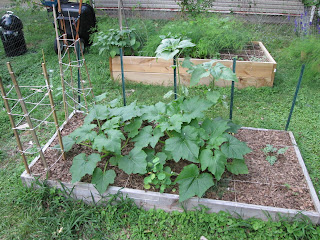I started a Facebook page called "
4 Chesapeake Hens."
Its fans have been working to change the zoning laws in Chesapeake,
Virginia. Currently, property must be zoned agricultural or be a
"residential estate" of three acres or more to keep laying hens. Our
group wants the city to allow up to six laying hens to be kept in most
residential areas. We have even started an
online petition that readers can sign.
Our
most recent campaign has been "City Council Member of the Week." Each
week our group chooses one member of City Council and asks our fan base
to make contact to politely explain why we wish to keep hens. I have
been emailing our City Council Members and getting no responses at all.
So I thought I'd also post my emails here for all to read. Here is my
email to our second member,
Suzy Kelly:
Dear Suzy Kelly,
I
am a resident and voter in Chesapeake and a founding member of the
local grassroots community group, "4 Chesapeake Hens." I am writing to
let you know how much it would mean to me and my family if zoning rules
were changed to allow more single-family residences to have 2-6 laying
hens, as outlined in our petition which you may read at http://www.change.org/petitions/4chesapeakehens#. The petition has gathered over 390 signatures as I type this, and we have been gathering more out in the community at large.
My
husband, Don Burke, and I live in a quiet, established community just
off of Battlefield Blvd on H...... Drive. We just married in April, 2012.
Originally, Don was going to sell his place
and live with me in Elizabeth City. But I found work as a teacher in
the Chesapeake Public Schools and moved here when Don, a retired Navy submariner, had trouble finding work in Northeastern N.C.
I
am a vegetarian and an avid gardener. I started vegetable gardening in
Elizabeth City when I was newly divorced, with no extra cash, and gas
climbed to $4.00 per gallon. I had to think twice about spending the
money to make trips to the local Walmart, so I bought seeds and started
gardening at home. My clay soil was terrible for growing anything, so I
got into composting to make my own, inexpensive amendments for improving
the soil on my lot. Even though the lot was much smaller than where we
live here, nobody ever complained about any smell, because we composted
responsibly and there was minimal odor to complain about.
Don
and I found that chicken
manure was one of the best sources of nitrogen and other nutrients for
my vegetables. I was regularly purchasing fresh, local eggs from a
friend, and picking up manure as well as eggs there became a regular
part of our routine. I buy local eggs not only to support the local
economy but because I am concerned about the environment, nutrition, and
animal welfare. The treatment of laying hens in the mass-produced
conditions that produce those cheap, nutritionally-inferior eggs we can
all buy cheaply at Walmart and the supermarket is abysmal. Visit the
Humane Society of the United States if you need more information:
http://www.humanesociety.org/issues/confinement_farm/facts/battery_cages.html.
The
nutritional value is important to me as a vegetarian, since eggs and
very occasional dairy are my only sources of animal-based protein and
nutrition. For Don, the healthier the eggs, the better. He is a cardiac
patient and on a low-fat, low-cholesterol, low-sodium diet. He had a
heart attack about five years ago, and neither of us wants to see a
repeat.
In Elizabeth
City, a few laying hens are allowed in most residential areas, even in
the city. There are rules about setbacks, cleaning up after your
animals, noise, and keeping them on your property, but they are allowed
and there are no issues or complaints that I know of. A few hens is (sic!) a
natural adjunct to gardening and sustaining oneself. This is just the
way it has always been.
I could not
keep hens where I lived due to a residential association in my
development. But, if the City will see fit to amend its zoning laws, Don
and I can have them here. They will eat the ticks and other insect
pests in our yard and convert weeds and kitchen scraps into high-value
protein and fertilizer. Three acres or more, such as on land zoned RE-1,
is not necessary to keep a micro-flock of laying hens, as I've outlined
in the following blog post:
http://mlcsgarden.blogspot.com/2012/03/how-much-space-do-laying-hens-need.html
Please,
Suzy, do a little research and learn more about keeping laying hens as
pets. They are allowed in New York City... that's right! Even in the
Bronx. There is no sound reason why we cannot keep them here. If you
have questions or concerns, let me know, and perhaps I can address them.
A book, City Chicks, by Patricia Foreman, is also a great resource and a fun read.
Mary Lou Burke
I sent this email on Monday, June 25, 2012. To date I have received no reply. To read my first letter, click
here.
Update: On 6/29/12 I sent Suzy Kelly this letter by certified mail. According to usps.com, the letter was delivered to City Hall on July 2, 2012, at 12:32 pm.
Update on 7/18: I met Suzy in person after Tuesday's City Council meeting. She is doing some preliminary research on the issue of urban chickens. She has started to answer some emails and we are developing a working relationship.













